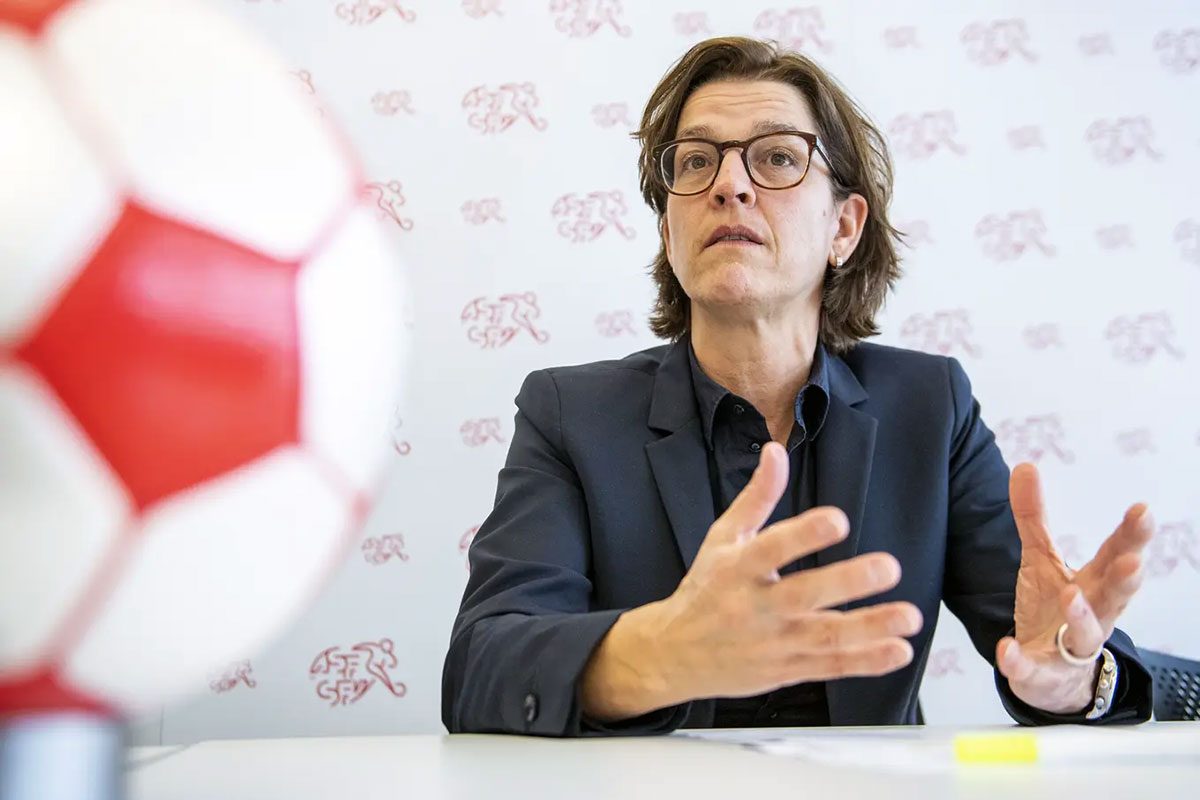Tatjana Haenni has been involved in women’s football most of her life, and certainly most of her career.
Now on the management board of the Swiss Football Association, Haenni has traveled with the Switzerland national team to their base in Leeds for the summer’s European Championships in England.
While Haenni will no doubt be supporting her side when they kick off against Portugal on Saturday, it will be an interesting trip for someone who has a hand in Switzerland’s bid to host the next tournament in 2025.
Placed in a difficult group with defending champions Netherlands and Olympic silver medalists Sweden, Switzerland is managing expectations after heavy defeats in warm-up games to Germany and England.
“Our expectations for the tournament are between ‘We are just happy be here’ and ‘Trying to do our best and seeing how far we can go,’” Haenni admitted.
“Clearly, we are not the favorites, so I would us a little bit of an underdog, but we will see. We aim to go to the quarterfinals and if we have a good start against Portugal, that becomes a little more realistic. But if not, a bit more difficult.”
Switzerland has dropped down to 20th in the world in the current rankings and this tournament is only their second Euros, after a group stage elimination in 2017.
The hiring of Nils Nielsen, who led Denmark to an unexpected final five years ago, was seen as a turning point, with some of their top players and brightest prospects dotted around some of Europe’s biggest teams, but it is yet to really come together on the pitch.
“I’ve been at the federation four years now and I think if I’m being honest, we have stepped back a little bit now,” said Haenni.
“At the Euros in 2017, we were maybe top 12, now we are more top 16 or top 20 and that’s clearly not what we want, so we have to work harder to get closer to the top teams. It has to do with investment, a clear strategy, with professionalizing the game, working with the pro men’s clubs and better player development, which we haven’t done much of in the past.”
She added: “We are lucky to have some good young players coming through, but there are not too many, we are really limited to this one or that one. Like Malin Gut, she’s now injured, but we need those one or two to become 10 or 15 or 20, we have to work hard on that area because we are not good there.”

With Noelle Maritz and Lia Wälti at Arsenal, Ramona Bachmann at Paris Saint-Germain, and Ana-Maria Crnogorčević at FC Barcelona, plus many more dotted around France and Germany, players are reaching some of the biggest and best in Europe, with their top youngsters now also heading abroad.
To see the likes of Maritz, Wälti, Bachmann, and others playing in top domestic leagues and the UEFA Champions League, Haenni believes it will have a “massive” impact on young girls growing up in Switzerland and improving participating levels.
“They know from growing up in education and everything you need role models. You can only get to what you see and I think our young players see that. They are way more in the media now, we have our AXA Women’s Super League, every match is live-streamed for free and a match every month is on TV.
“The media coverage has been good lately and it’s important for these young players to see these players on TV and know you can earn a living from it. We have three players who are now becoming doctors, two of them were national team players at 22 and 23 but to become a doctor you study, you have to make a choice and that is a problem for us because we lose too many young players who go the other way, away from football.”
Eight of the current squad play in the German Bundesliga, including two of their top teenage talents, Riola Xhemaili and Svenja Fölmli, and Haenni believes it is important for young players to be exposed to these experiences early on, but also hopes to be able to develop the domestic game at the same time through more professionalization.
“Our players always went to Germany,” she recalled. “Caroline Abbé, our team manage here, she played for SC Freiburg and Bayern Munich. For Germany, the Swiss players are a dream. They have good education, they are young, they’re good, we have really good players and they get them for free at 18.
“They are not professional, they are amateurs, so Freiburg can come and say, ‘Okay, Riola Xhemaili, she looks good,’ and woof, she’s gone, and all the work from Swiss clubs is for nothing. We’ve changed the system now, we tried to convince the clubs to put them even on an amateur contract for two or three years, even if it’s not much money, so if a Freiburg comes than at least you can negotiate and that’s starting to fall into place. We want them to go and play in the top teams, but we don’t want to give them away for free. We’re pretty proud we could change the system.”
Haenni says a major tournament will “help” the Swiss team and give more visibility to the national team and the women’s game, but it has not been a plain-sailing route as they look to make it to the World Cup next summer.
Switzerland is bidding to host the next Euros in 2025 alongside bids from France, Poland, and a four-way bid from Sweden, Denmark, Norway, and Finland, and given its an attractive location with good transport links, they may have a good chance of getting what they want.
While Haenni is conservative about their chances, she does believe the chance to further develop the game in Switzerland should be taken into account.
“I respect all the other countries bidding. Looking at England, people might think Switzerland is too small, our stadiums are smaller, we don’t have an 80,000-seater stadium, but on the other hand, I don’t think it is just about figures, ticket sales and income, it’s about how you can touch a whole country and influence women’s football in Switzerland.
“We are known as a safe country, there’s easy access, and public transport is easy. People can watch games every day, you are through the country in a few hours. I think we would touch everyone. We only have eight million inhabitants and that makes it a culture change and that’s one of the biggest assets of having a major tournament.”

